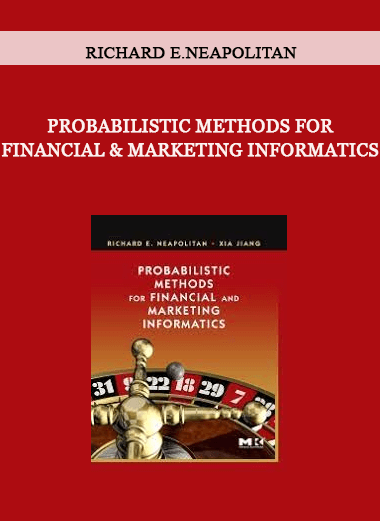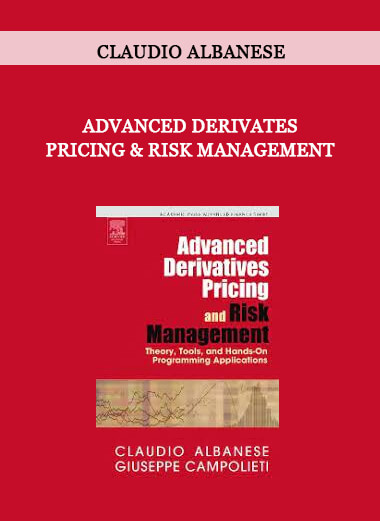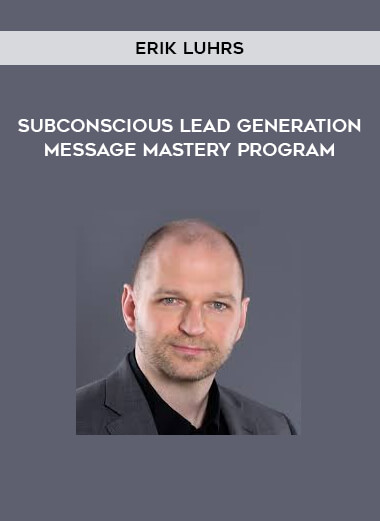Courses Infomation
Richard E.Neapolitan – Probabilistic Methods for Financial & Marketing Informatics
Richard E.Neapolitan – Probabilistic Methods for Financial & Marketing Informatics
**More information:
Description
Probabilistic Methods for Financial and Marketing Informatics aims to provide students with insights and a guide explaining how to apply probabilistic reasoning to business problems. Rather than dwelling on rigor, algorithms, and proofs of theorems, the authors concentrate on showing examples and using the software package Netica to represent and solve problems.
The book contains unique coverage of probabilistic reasoning topics applied to business problems, including marketing, banking, operations management, and finance. It shares insights about when and why probabilistic methods can and cannot be used effectively.
This book is recommended for all R&D professionals and students who are involved with industrial informatics, that is, applying the methodologies of computer science and engineering to business or industry information. This includes computer science and other professionals in the data management and data mining field whose interests are business and marketing information in general, and who want to apply AI and probabilistic methods to their problems in order to better predict how well a product or service will do in a particular market, for instance.
Typical fields where this technology is used are in advertising, venture capital decision making, operational risk measurement in any industry, credit scoring, and investment science.
Review
Financial Development Course
Financial development means some improvements in producing information about possible investments and allocating capital, monitoring firms and exerting corporate governance, trading, diversification, and management of risk, mobilization and pooling of savings, easing the exchange of goods and services.
Salepage : Richard E.Neapolitan – Probabilistic Methods for Financial & Marketing Informatics
About Author
Richard E. Neapolitan
Richard E. Neapolitan is a mathematician and computer scientist. When he received his Ph.D. in mathematics from the Illinois Institute of Technology in the 1970s, there was a recession in the United States and a glut of mathematicians. So, he worked as a male model and in various computer related positions. The latter experience enabled him to obtain a computer science faculty position at Northeastern Illinois University in 1980, at which time he embarked on his career as a computer science professor and researcher.
Dr. Neapolitan is most well-known for his role in establishing the field of Bayesian networks. In the 1980s, researchers met at the newly formed Workshop on Uncertainty in Artificial Intelligence (now a conference) to discuss how to best perform uncertain inference in artificial intelligence. Dr. Neapolitan’s seminal text Probabilistic Reasoning in Expert Systems integrated many of the results of these discussions into the field we now call Bayesian networks. Bayesian networks have arguably become the standard for handling uncertain inference in AI, and many AI applications have been developed using them.
Since 1990, Richard has conducted further theoretical research in philosophy of science, probability and statistics, decision analysis, and cognitive science; and he has applied probabilistic modeling to fields such as medicine, biology, psychology, and finance. Dr. Neapolitan has earned an international reputation both as a theoretician and a practitioner. Other books he has written include Learning Bayesian Networks (2004); Foundations of Algorithms (1996, 1998, 2003, 2010, 2014), which has been translated into three languages; Probabilistic Methods for Financial and Marketing Informatics (2007); Probabilistic Methods for Bioinformatics (2009); and Artificial Intelligence: With an Introduction to Machine Learning (2018). His approach to textbook writing is distinct in that he introduces a concept or methodology with simple examples, and then provides the theoretical underpinning. As a result, his books have the reputation for making difficult material easy to understand without sacrificing scientific rigor.
































Reviews
There are no reviews yet.